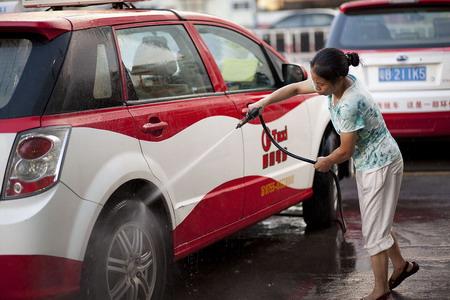
A worker washes a BYD Co E6 electric taxi in Shenzhen, Guangdong province. BYD's sales fell in May, continuing a 10-month decline. Its flagship model F3 has fallen to fourth position from No 1 on the list of top-selling domestic cars. [Photo: Bloomberg]
Chinese battery and carmaker BYD Co Ltd reported an 84 percent profit decline in the first quarter in a statement filed with the Hong Kong Stock Exchange on Wednesday, a day before going public in Shenzhen.
On news of the net income plunge, the H-share listed company's stock fell nearly 7 percent in Hong Kong trading on Wednesday, its biggest decline in more than three months. The share price finally closed at 23.90 yuan ($3.70), a 4.59 percent fall from the opening price.
The automaker raised 1.35 billion yuan from an A-share listing in Shenzhen this month to fund expansion and invest in research and development. The stock will start trading in Shenzhen on Thursday under a plan calling for up to 79 million shares to be issued at 18 yuan apiece.
According to its financial report, the company backed by Warren Buffett had revenue of 11.7 billion yuan in the first quarter, an 11.6 percent decline from the same period a year ago. Its net profit dived 84.35 percent to 266.7 million yuan, from 1.7 billion yuan a year earlier.
The Shenzhen-based company said in the statement that the sharp decrease can be attributed to declining vehicle sales and rising management and financing costs during the period.
Hit by the shrinking demand in China's automobile market, BYD's car sales continued to decline for the 10th consecutive month in May, as its flagship model F3 has fallen to fourth position from No 1 on the domestic top-selling car list.
"The year of 2011 will be a tough one for BYD, for, I believe, it will be hard for the company to achieve its 10-plus percent sales growth target by the end of the year," said Li Kang, an analyst with China Merchants Securities Co Ltd.
"Currently, it doesn't have a competitive and complete product line-up, and it still needs time to get revenue moving in the new-energy vehicle sector."
In April, China's automobile sales experienced their first negative year-on-year growth in more than two years, owing to the expiration of the central government's incentive policies, rising gas prices, and limits placed on car purchases and vehicle use in large cities, plus the earthquake in Japan.
Domestic sales continued to slow down with further negative month-on-month passenger vehicle sales growth in May, sparking concern that the auto industry may have difficulty reaching its previous sales target of 20 million vehicles this year.
Analysts said that because of the downtrend, China's homegrown automakers face more pressure than their foreign rivals because they are weak in quality and branding.
Statistics from the China Passenger Car Association show that in May, the 21 Chinese domestic automakers sold 294,000 passenger cars, a mere 0.2 percent year-on-year increase, and a 7.5 percent decline from the previous month. Leading the trend was Beijing Automotive Group Co Ltd, which saw a 46.4 percent year-on-year sales decline.
Domestic automakers' market share in China also dipped 2.49 percent in the first five months.
Jia Xinguang, an independent auto analyst based in Beijing, said that domestic auto brands' loss of market share is not surprising.
"They are not as capable as foreign automakers regarding their products and operations. And they lack experience to adjust to the rapidly changing market," Jia said. "The (incentive) policy cannot support their development for a long time. They should strengthen their ability to produce high-quality cars."
Zhong Shi, another auto analyst, said that domestic carmakers should also pay great attention to after-sales services to promote their brands.




